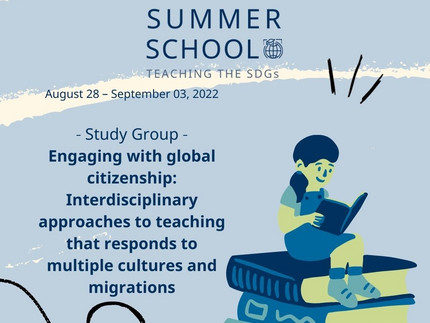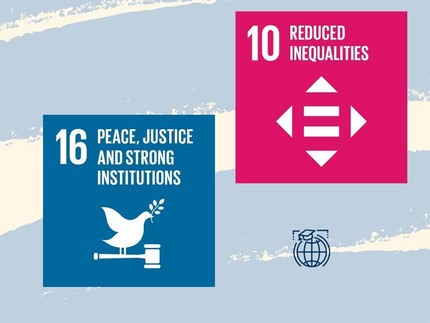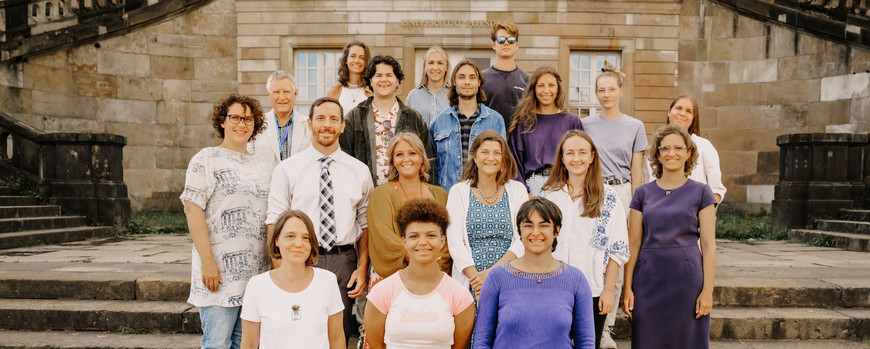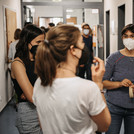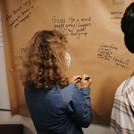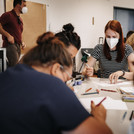Study Group English / History / Social Studies:
"Engaging with Global Citizenship: Interdisciplinary Approaches to Teaching that responds to multiple Cultures and Migrations"
Die Study Group „Engaging with Global Citizenship“ verfolgte das übergeordnete Ziel eines interdisziplinären Ansatzes für Global Citizenship Education, in dessen Mittelpunkt Fragen der Migration, Sprache und Kultur sowie Identitäten stehen sollten. Gemeinsam mit den Dozierenden aus der Fremdsprachendidaktik und der Geschichtswissenschaft entwickelten die Teilnehmenden ihr Verständnis für historische und gegenwärtige Migrationen sowie für eine transformative, kultursensible Pädagogik weiterzuentwickeln, um so Lernende mit unterschiedlichsten Hintergründen bestmöglich unterstützen zu können.
Die Kurslektüre und -aktivitäten aus der Fremdsprachendidaktik und Geschichte und regten die Studierenden dazu an, diverse Vorstellungen und Misconceptions von Migration, Migranten und Identitäten, deren Wirkungen in und auf Gemeinschaften und das Klassenzimmer sowie die Unterrichts- und Kommunikationsstrategien von Lehrer*innen kritisch zu untersuchen. Der Austausch mit internationalen Kommiliton*innen, zunächst online und dann persönlich während der Summer School, war dazu angedacht, diese Lernerfahrung noch zu vertiefen. Die Aufgaben und Aktivitäten, die während der Summer School durchgeführt wurden, hatten das Ziel, sowohl die individuelle Reflexionsprozesse der Studierenden anzuregen als auch den gemeinsamen Austausch in Gesprächs- und Diskussionsrunden zu unterstützen. Folgende zentralen Themen wurden dabei aus unterschiedlichen Disziplinen betrachtet:
- What ideas or (mis-)conceptions about history, migrations or identities do learners bring to the classroom? How can teachers challenge problematic scripts (e.g. about ‘who belongs’) and contribute to more inclusive narratives?
- How can we disrupt common scripts, misconceptions or (myth)stories through the use of stories or historical narratives?
- In what ways are migrants (and refugees) represented in the media / in course books and how do these representations shape perceptions?
- How can stories of migration contribute to understanding migration issues?
- How do / can I as a teacher use language as a tool that includes and empowers learners?
Während der Summer School hatten die Teilnehmenden die Gelegenheit, in internationalen Teams an einem von drei spezifischen Themen im Bereich Global Citizenship Education zu arbeiten:
1) "Hard History" and Anti-Bias Pedagogy; 2) sprachliche und kulturelle Vielfalt im Unterricht; und 3) Voices, visuals, and the learning environment.
Die Study Group verfolgte insgesamt die folgenden Seminarziele:
- articulate coherent goals for global citizenship education and how these shape teaching and learning in a variety of disciplines, and educational settings
- analyze and evaluate strategies for transformative pedagogy that promotes an active, inclusive and equitable learning environment and empowers diverse learners to take informed decisions and act as agents of change
- analyze, assess and articulate the role of language, and its negotiation, in the teaching-learning dynamic, including sensitive contexts
- reflect upon and articulate factors shaping teachers’ and students’ identities within a range of overlapping spheres, from the personal and local to the global.
- articulate ways that migrations (including (non-)settlements have shaped histories and identities, and ideas about them, from the individual and local levels to national and global levels.
- apply concepts from migration studies, historical understanding, and additional fields to analyze current issues and debates about migrations and identities, including educational challenges and responses if appropriate.
- apply their course learning to practical problems, in education and other social arenas, through course activities and in a final team project/presentation.

